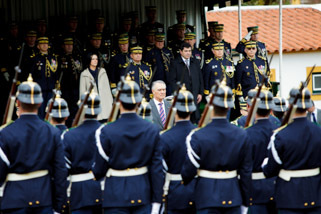

The President of the Republic decided not to enact the decree which altered the Parliamentary Electoral Legislation.
With reference to this decision, the Presidency of the Republic makes public the following communiqué:
1 – The President of the Republic decided today not to enact the Parliamentary decree which altered for the fifteenth time the Parliamentary Electoral Legislation.
2 – This decree obliges citizens residing abroad to personally exercise their voting rights in Parliamentary elections, breaking away from a thirty year old tradition.
3 – This proposed alteration would bring about electoral absenteeism, as was asserted by the Standing Committee of the Portuguese Communities, underlining the difficulties inherent to the personal exercise of voting rights, which would oblige thousands of people to travel hundreds or thousands of kilometres to exercise such fundamental rights which are, at the same time, a demonstration of civic, political and affective bonds with Portugal.
4 – An alteration with such an extent could only be acceptable if, by any chance, one of the two following circumstances would occur: that, after more than thirty years in force, such a practice had given rise to systemic electoral fraud or wrongdoing; or that a conclusion had been reached that such a practice, in force since 1976, is contrary to constitutional principles.
5 – The experience of more than thirty years does not demonstrate the occurrence of either electoral fraud or wrongdoing in the exercise of absentee balloting. On the contrary, the results obtained in emigrant constituencies have never been queried by any of the political parties, neither the constitutionality of absentee balloting was ever queried in the case of Parliamentary elections.
6 – Moreover, taking into account the size of our consular network, the only possible conclusion that may be reached is that it is totally unable to fully satisfy the needs of our communities abroad. Surely not accidentally, the decree accepts that voting rights may be exercised in locations other than consular posts or sections, and also in official facilities made available by the authorities of the host countries or in the headquarters of Portuguese associative organizations.
It happens, however, that official information received states that the authorities of some countries do not permit that the exercise of voting rights takes place outside official Portuguese facilities. With respect to other countries, there is no information guaranteeing an effective, adequate and timely number of ballot stations when the date of the electoral act becomes known.
Lastly, when foreseeing a period of three days for the suffrage to take place, several issues have to be considered, such as the guarantee of the sanctity of the ballot urns outside the consulates, as has been underlined by the Consular Workers’ Union, which could threaten the electoral transparency more forcefully than the model of absentee balloting which is currently in force.
7 – As such, considering that there are no acceptable reasons for the proposed alteration and that, on the contrary, it is a national imperative to combat electoral absenteeism and to promote the bonds linking emigrant citizens to Portugal, even with recourse to new technologies, the President of the Republic decided not to enact the organic law approved by Parliamentary Decree No. 261/X.
Click here to read the full text of the message the President of the Republic addressed to Parliament
© 2006-2016 Presidency of the Portuguese Republic
You have gained access to the records of the Official Site of the Presidency of the Republic from 9 March 2006 to 9 March 2016.
The contents available here were entered in the site during the 10 year period covering the two mandates of President of the Republic Aníbal Cavaco Silva.